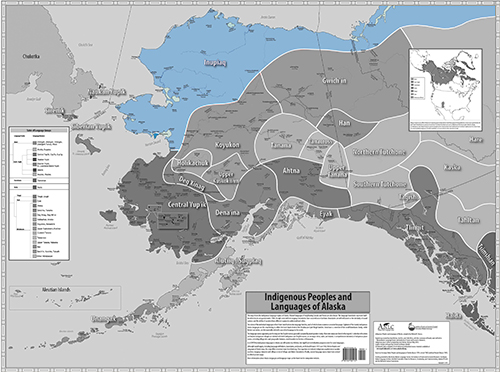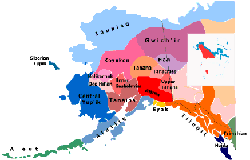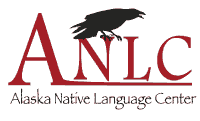Iñupiaq

Iñupiaq is spoken throughout much of northern Alaska and is closely related to the Canadian Inuit dialects and the Greenlandic dialects, which may collectively be called "Inuit" or Eastern Eskimo, distinct from Yupik or Western Eskimo.
Alaskan Iñupiaq includes two major dialect groups: North Alaskan Iñupiaq and Seward Peninsula Iñupiaq. North Alaskan Iñupiaq comprises the North Slope dialect spoken along the Arctic Coast from Barter Island to Kivalina, as well as the Malimiut dialect, which is found primarily around Kotzebue Sound and the Kobuk River. Seward Peninsula Iñupiaq comprises the Qawiaraq dialect, found principally in Teller and in the southern Seward Peninsula and Norton Sound area, as well as the Bering Strait dialect spoken in the villages surrounding Bering Strait and on the Diomede Islands.
Dialect differences involve vocabulary and suffixes (lexicon) as well as sounds (phonology). North Slope and Malimiut are easily mutually intelligible, although there are vocabulary differences (tupiq means 'tent' in North Slope and 'house' in Malimiut; iglu is 'house' in North Slope) and sound differences ('dog' is qimmiq in North Slope and qipmiq in Malimiut). Seward Peninsula and North Alaskan dialects differ significantly from each other, and a fair amount of experience is required for a speaker of one to understand the dialect of the other. For example, each uses a completely different verb stem for 'talk' ('they are talking' is qaniqtut in Seward Peninsula but uqaqtut in North Alaskan). Sound differences are also numerous ('they are cooking' is iarut in Seward Peninsula but igarut in North Alaskan).
The name "Iñupiaq," meaning "real or genuine person" (inuk 'person' plus -piaq 'real, genuine'), is often spelled "Iñupiaq," particularly in the northern dialects. It can refer to a person of this group ("He is an Iñupiaq") and can also be used as an adjective ("She is an Iñupiaq woman"). The plural form of the noun is "Inupiat," referring to the people collectively ("the Inupiat of the North Slope").
Alaska is home to about 13,500 Inupiat, of whom about 3,000, mostly over age 40, speak the language. The Canadian Inuit population of 31,000 includes about 24,000 speakers. In Greenland, a population of 46,400 includes 46,000 speakers.
Common Expressions
(In Iñupiaq, the vowels [a, i, u] are pronounced in the same way as the same vowels in Spanish or Italian; r is similar to English r; ġ is similar to French or German r; ŋ is the ng sound; ñ is pronounced ny as in Spanish, ļ is an ly sound and ł is a voiceless l. Double letters are pronounced long [held longer] and single letters are short.)
| tautugniaqmigikpiñ | good-bye |
| quyanaq | thank you |
| qaimarutin | welcome |
| Nayaaŋamik Piqaġiñ | Merry Christmas |
| qanuq itpich? | Hello, how are you? |
Common Phrases
| Qanuq itpiñ? | How are you? |
| Nakuuruŋa. | I am fine |
| Kiña ilviñ? | What's your name? |
| Uvaŋa Nanuq. | I am Nanuq |
Dog Names
Some of these names were provided by Leona Okakok and are typical dog names used by Inupiat people of the North Slope. Some other names were taken from the Inupiat Dictionary, compiled by Webster & Zibell.
| kinguyakkii | northern lights |
| maguyuk | howler |
| miki | little |
| nanuq | polar bear |
| pakak | one that gets into everything |
| pamiiruq | wags his tail |
| puqik | smart |
| qannik | snowflake |
| qimmiq | dog |
| qimukti | puller |
| siku | ice |
| suka | fast |
| tupit | tattoo lines on face |
| amaġuq | wolf |
Links and Resources
 Learn More:
Learn More:
Alaska is home to at least twenty distinct indigenous languages. More than just dialectal variants, these different languages reflect the cultural heritage of Alaska's Native peoples. For more information about particular languages, click below.


